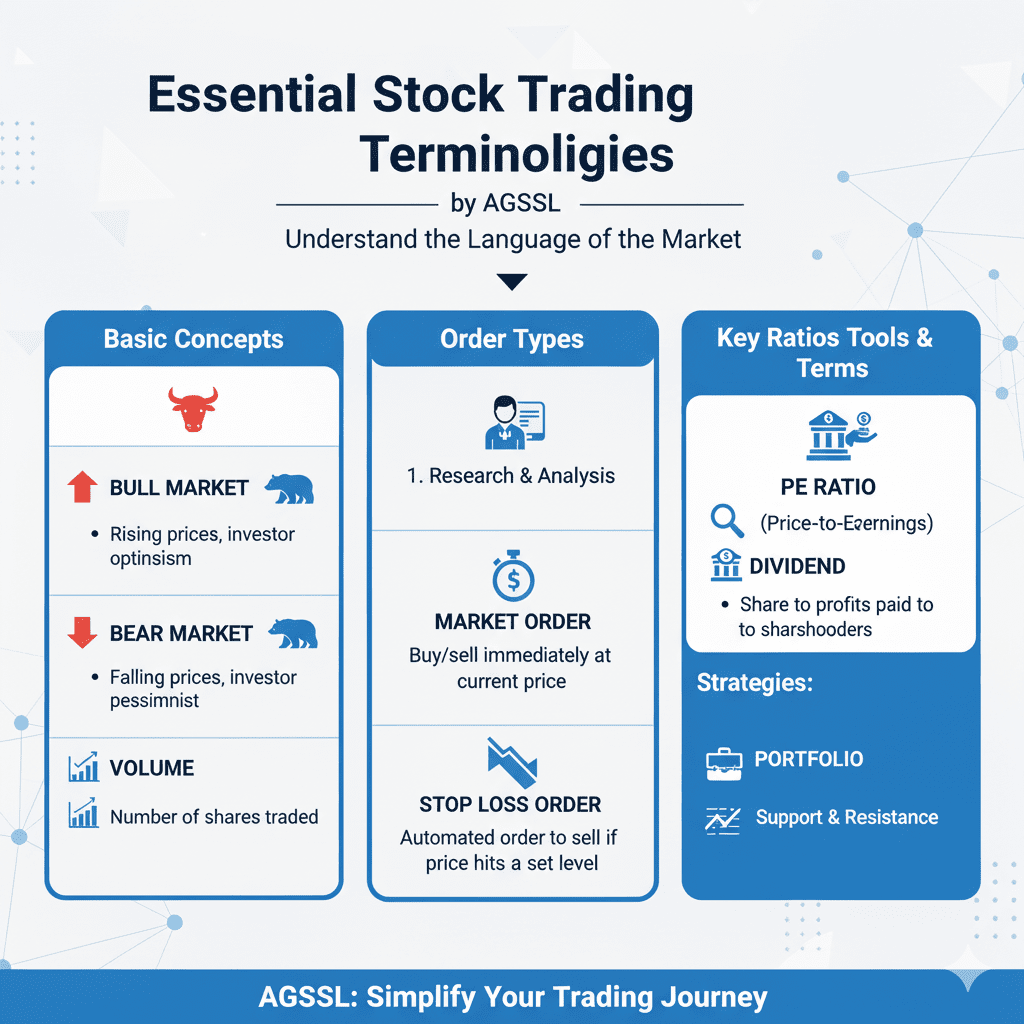Stock Trading Terminologies
-
 Aug-12-2025
Aug-12-2025
Stock Trading Terminologies
Margin Amount
- The margin amount acts as a financial guarantee placed by the trader with the broker at the start of trading. Brokers use this to ensure traders can cover potential losses.
- Its size depends on the securities and trading volume. For derivatives and margin trading, it’s compulsory and calculated using exchanges’ formulas.
- Holding a sufficient margin is crucial for maintaining trading positions and avoiding forced sell-offs in case of market drops.
Margin Funding
- Margin funding allows investors to leverage their trades by borrowing from brokers. For instance, if you want to buy stocks worth ₹1,00,000 but have only ₹40,000, the broker can lend the balance.
- Leveraged buying can amplify profits if shares rise, but risks are notably higher—losses on borrowed funds must be repaid even if the investment loses value.
- Brokers charge interest on funded amounts, and margin calls can happen when losses exceed a certain threshold, requiring additional deposits or automatic position liquidation.
Contract Note
- The contract note is a legally binding document generated after trade execution. It typically arrives via email or through the broker’s portal.
- Key elements:
- Broker’s details (including SEBI registration for regulatory compliance)
- Order details (buy/sell, time stamp, trade reference numbers)
- Security details (name, quantity, price per unit)
- Charges breakdown: brokerage, GST, stamp duty, Securities Transaction Tax (STT)
- Settlement and client details for trade tracking.
- Regulators require brokers to share these notes for every completed transaction, promoting transparency and documentation.
Settlement Types
Rolling Settlement
- Trades are settled by netting obligations each day: for example, buy 100 shares, sell 50, net buy is 50 shares.
- Settlement is usually T+2—two trading days after the transaction.
- This system helps ensure quick and regular settlement cycles, reducing counterparty risk.
Account Period Settlement
- This older system grouped trades over several days before settling; no longer used since 2002.
- Discontinued due to inefficiency and increased risk—rolling settlement is now standard.
Corporate Actions
- Corporate actions are events initiated by the company altering securities or shareholder obligations.
- Types:
- Dividends: cash payments from profits.
- Stock splits: dividing shares to reduce share value and encourage more trading.
- Bonus issue: allocating free shares in fixed ratios.
- Rights issue: offering existing shareholders more shares at a discount.
- Mergers/acquisitions: organizational consolidation affecting shareholdings.
- Shareholders are notified in advance, with key dates like record date (who gets the benefit) and ex-date (to be eligible by this date).
Dividend
- Dividends are the distribution of a company’s profit. Paid periodically if the company performs well.
- Types: Interim (within the year) and Final (at year-end).
- Key dates: Declaration, record, ex-, and payment date.
- The company isn’t obliged to pay dividends—a decision made by the board and approved by shareholders.
Bonus Issue
- A bonus issue transfers reserves to share capital, increasing shareholders’ holdings without cash payment.
- Example: A 2:1 bonus gives a shareholder with 100 shares an additional 200, totaling 300.
- Makes the stock more affordable and often reflects positive company performance.
- No tax is paid on receipt, but capital gains tax applies on eventual sale.
Stock Split
- A stock split, such as 2-for-1, doubles your share count and halves the face value per share.
- The market capitalization doesn’t change, but the share price is reduced, inviting smaller investors and increasing trading liquidity.
Rights Issue
- Allows existing shareholders to buy additional shares at a reduced price.
- Example: For every 4 held shares, you may buy 1 more at a set discount.
- Companies use rights issues to raise capital for expansion, debt repayment, or other corporate needs.
- Shareholders can exercise, ignore, or sell their rights; unexercised rights can dilute ownership.



